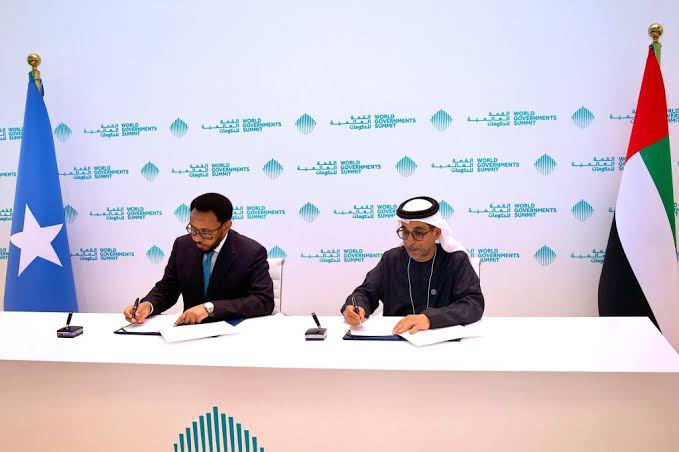Facebook Twitter (X) Instagram Somali Magazine - People's Magazine
Somalia has successfully reached an agreement with the Abu Dhabi Development Fund (ADFD) to settle a longstanding debt of $257 million tied to the former Juba Sugar Factory project. This milestone is part of Somalia’s broader economic recovery strategy, aiming to resolve historical debts and improve financial stability.
Somalia’s Minister of Finance, Bihi Iman Igeh, and ADFD Director General Mohamed Saif Al-Suwaidi signed the agreement in Dubai during the World Government Summit. This deal is expected to open new avenues for economic collaboration between Somalia and the United Arab Emirates, focusing on infrastructure development, poverty alleviation, and long-term financial stability.
Minister Bihi Iman Igeh announced the agreement on social media, stating that Somalia had officially settled its outstanding obligations with ADFD, marking a crucial step toward economic recovery. The resolution of this debt allows Somalia to redirect resources toward national development initiatives while fostering stronger international partnerships.
The Juba Sugar Factory project, which dates back decades, was initially funded by loans that later became a financial burden on Somalia due to prolonged economic instability and conflict. The inability to service these loans resulted in mounting debt, making it challenging for the country to secure new investments and financial support from global lenders. With the settlement of this debt, Somalia can now position itself as a more viable destination for foreign investment and economic assistance.
This debt relief agreement follows a series of successful international financial negotiations that Somalia has pursued in recent years. In 2023, Somalia secured a historic $4.5 billion debt relief package from international creditors, including the International Monetary Fund (IMF) and the World Bank. The following year, the Somali government reached another significant debt forgiveness deal with the United States, totaling more than $1.14 billion. These achievements have been crucial in reducing Somalia’s overall debt burden and improving the country’s creditworthiness on the global stage.
Economic experts have lauded Somalia’s efforts in securing debt relief, noting that these measures are essential for stabilizing the country’s financial system and promoting sustainable growth. The settlement with ADFD, in particular, is expected to pave the way for new developmental initiatives aimed at rebuilding key sectors such as agriculture, infrastructure, and public services. With greater financial flexibility, Somalia can focus on implementing economic reforms that attract foreign direct investment and create employment opportunities for its citizens.
The Somali government has been actively working to restore economic confidence by implementing policies that encourage fiscal responsibility and transparency. The resolution of historical debts is a key component of this strategy, as it demonstrates Somalia’s commitment to honoring financial obligations while seeking international support for long-term development. By settling its debt with ADFD, Somalia strengthens its ties with the United Arab Emirates, a country that has been a crucial economic partner in the region.
Somalia’s progress in securing debt relief is also expected to have a positive impact on the country’s financial relations with other Gulf nations and international financial institutions. As Somalia continues to engage in economic diplomacy, it is likely to attract further investments that support national growth and stability. The government has emphasized that reducing debt and increasing foreign investment are critical steps in achieving long-term economic resilience.
Despite these advancements, Somalia still faces significant economic challenges, including high unemployment rates, inadequate infrastructure, and ongoing security concerns. However, with strategic financial management and continued international cooperation, the country is gradually moving toward a more stable and prosperous future. The successful settlement of the ADFD debt represents a key victory in Somalia’s ongoing efforts to rebuild its economy and strengthen its global financial standing.

